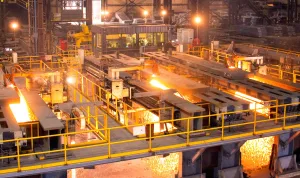How Hong Kong’s Steel Industry Manages Price Volatility in Global Markets

Steel prices are known for their high volatility, driven by global factors such as fluctuations in raw material costs, international trade policies, demand-supply imbalances, and geopolitical tensions. In Hong Kong, where steel production is limited, and the market heavily relies on imports, handling price volatility is a critical component of the industry’s strategy. Here’s how Hong Kong’s steel industry navigates these fluctuations and maintains stability in the face of uncertain pricing.
1. Hedging and Financial Instruments
One of the most effective ways Hong Kong steel traders and importers manage price volatility is through hedging on international commodity exchanges. Steel prices are often influenced by fluctuations in key raw materials like iron ore and coking coal. By using derivatives and futures contracts on platforms like the London Metal Exchange (LME), companies can lock in prices for future transactions, reducing the risk of sudden price hikes.
- Risk Management Tools: Futures contracts allow steel traders to hedge against the risk of rising raw material costs, while options give them the flexibility to buy or sell at predefined prices, thereby mitigating financial exposure to price swings.
2. Diversified Supply Chains
Hong Kong’s steel industry relies heavily on imports from major steel-producing countries such as China, Japan, and South Korea. To handle price fluctuations, companies diversify their supply chains by sourcing from multiple suppliers. This diversification provides flexibility, allowing companies to shift their supply base depending on pricing trends and availability.
- Global Sourcing Strategies: When prices spike in one region, Hong Kong companies can source steel from alternative suppliers, ensuring competitive pricing and stability in the supply of materials.
3. Collaborating with Financial Institutions
Hong Kong’s financial infrastructure plays a significant role in helping steel companies manage pricing risks. Local banks and financial institutions offer specialized trade finance solutions, enabling steel importers to manage cash flow effectively and negotiate better pricing terms with suppliers. These solutions include letters of credit, trade guarantees, and invoice financing.
- Leverage of Credit Facilities: By securing favorable credit terms, steel companies in Hong Kong can cushion themselves against short-term price volatility, allowing them to better manage their financial exposure.
4. Adjusting Contract Terms
Hong Kong’s steel importers often negotiate flexible contracts with their suppliers to accommodate price volatility. This might include long-term contracts with variable pricing based on market indices or spot pricing agreements that adjust according to the latest commodity prices.
- Flexible Contracting: By embedding clauses that allow for price adjustments in response to market conditions, Hong Kong companies ensure that they are not locked into unfavorable pricing during periods of volatility.
5. Market Intelligence and Data-Driven Strategies
To anticipate and respond to steel price volatility, Hong Kong’s steel industry invests heavily in market intelligence. Data-driven approaches allow companies to track global market trends, monitor demand-supply dynamics, and predict future price movements.
- Advanced Analytics: Using predictive analytics and data from global steel markets, companies can make informed decisions about when to buy or sell steel, optimizing their pricing strategies and minimizing risks associated with price swings.
6. Leveraging Trade Relationships with Mainland China
As a key intermediary for steel trade with mainland China, Hong Kong benefits from close economic ties and preferential trading arrangements with the world’s largest steel producer. This relationship gives Hong Kong access to Chinese steel at competitive prices, helping to buffer the local market against the volatility seen in global markets.
- Mainland Advantage: Even when global prices fluctuate, the proximity and trade agreements with China enable Hong Kong companies to secure stable steel supplies and pricing more reliably than other markets.
Conclusion: Navigating Volatility with Precision
While price volatility in the global steel market presents significant challenges, Hong Kong’s steel industry is well-positioned to handle these fluctuations through a combination of financial tools, diversified supply chains, flexible contracts, and market intelligence. These strategies allow Hong Kong’s steel importers and traders to maintain competitiveness and stability in a highly unpredictable market.



